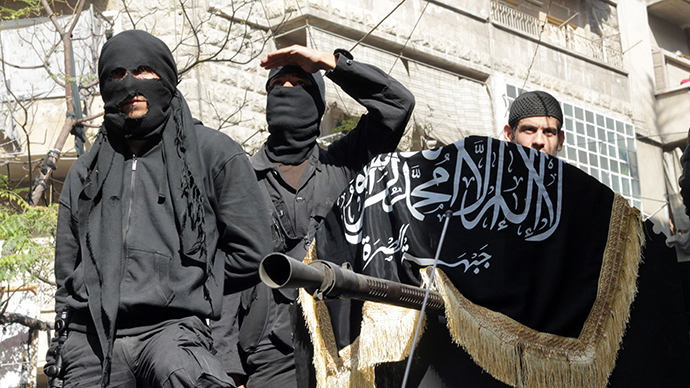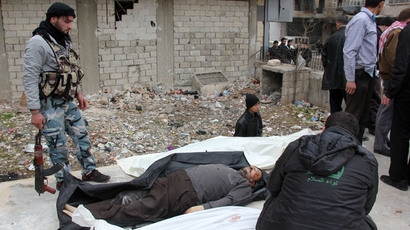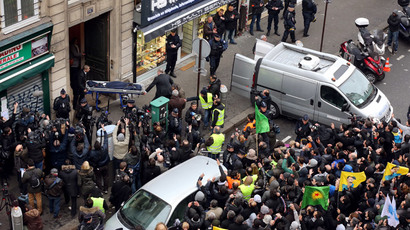From ‘blind eye’ to crackdown: UK confused over Brits fighting in Syria?

Britain is about to unleash plans for a tougher crackdown on Britons allegedly fighting in Syria. Human rights activists believe the UK could have inspired some of its citizens to join extremists by its own support for the anti-Assad rebels.
The Queen’s speech on Wednesday will, according to a leak,
outline plans for a tough crackdown on terrorism. An estimated
400 UK citizens are currently fighting in Syria, some of them
reportedly with an Al-Qaeda affiliate, the Islamic State of Iraq
and the Levant (ISIL).
Read more about UK fighters in Syria
“Our message is clear – the UK advises against all travel to
Syria. Anyone who does travel, for whatever reason, is putting
themselves in considerable danger,” an anonymous government
source told the Daily Mail.
This tougher approach is to be announced as Europe grows ever
more concerned with what to do with its citizens, returning from
battlefields in Syria. Especially so, following the detention on
Sunday of a French suspect who is allegedly responsible for last
week‘s Brussels Jewish Museum shooting, and before that
reportedly fought in Syria.

In France on Monday, four people were arrested on suspicion of
helping recruit jihadists to fight in Syria according to French
Interior Minister Bernard Cazeneuve’s interview to Europe 1
radio.
The UK has lately seen a number of convictions of citizens who
traveled to Syria. It began two weeks ago with Mashudur
Choudhury, who was convicted of preparing for acts of terrorism
in a foreign country. It was argued he aimed to join
Al-Qaeda-inspired rebels fighting in Syria. The evidence was
largely taken from his social media. Choudhury’s conviction has
since been followed by two more on similar charges.
“The big fear is 400-500 people going to learn in the
battlefield how to be a terrorist,” Margaret Gilmore from
Britain’s Royal United Services Institute told RT’s Sara Firth.
“The fear is what happens when they come back. That’s why the
authorities here are taking a hardline approach.”
In May, British MPs demanded that UK fighters in Syria should
have their passports revoked when they come back, so
that they were not able to travel anymore.
In April, police in Britain had a campaign urging Muslim mothers to report it talk to
the authorities if they believed their children wanted to go and
fight in Syria.
Despite the crackdown, the number of those willing to go to Syria
and fight alongside the rebels there might not decrease,
according to one Brit - who traveled to Syria to provide aid, not
to fight, and spoke to RT anonymously.
“People are going to go regardless,” he said. “These
people are going for what they believe in. So the question has
been turned back to the British Government ... the [British]
people are saying ‘Let’s prevent these people.’ What are you
preventing? One man’s terrorist is another man’s freedom fighter.
That's what you have to realize.”
Human rights lawyer, Fahad Ansari, believes the government is
being hypocritical in its crackdown on those who went to Syria.
“The most troubling aspect of this for me is that two years
ago this government was very supportive of the rebels and they
turned a blind eye to many Muslims who went over to Syria to
fight,” Ansari told RT.
“The authorities have clearly said if somebody wants to go
fight with jihad then they are going to be arrested and that is a
criminal offence - that is illegal. However what if someone was
to go and fight with the Free Syrian Army (FSA), who are a
secular outfit, would that be allowed? Would that be permissible?
We do not know.”

RT put that exact question to the Crown Prosecution Service.
“Becoming involved in terrorist training abroad or fighting
in a conflict abroad is potentially an offence under that
law,” was the reply. But when pushed on whether fighting
with the FSA in particular might constitute an act of terrorism
they refused to clarify further.
The British government doesn't really know how to deal with the
returning fighters, according to investigative journalist Paul
Lashmar, who believes authorities actually reap what they sow.
“The UK position on Syrian terrorism, as I can put it, is
confused,” Lashmar told RT. “Initially the UK was
supporting the insurgency against President Assad. They thought
the Free Syrian Army was supportable, but the whole thing’s got
terribly confused by the fact of the rise of Islamic elements of
the insurgency.”
Western security officials estimate that up to 2,000 European
citizens are fighting against the Assad government forces in
Syria. That's almost a fifth of the entire foreign fighter
population in the Arab country.














